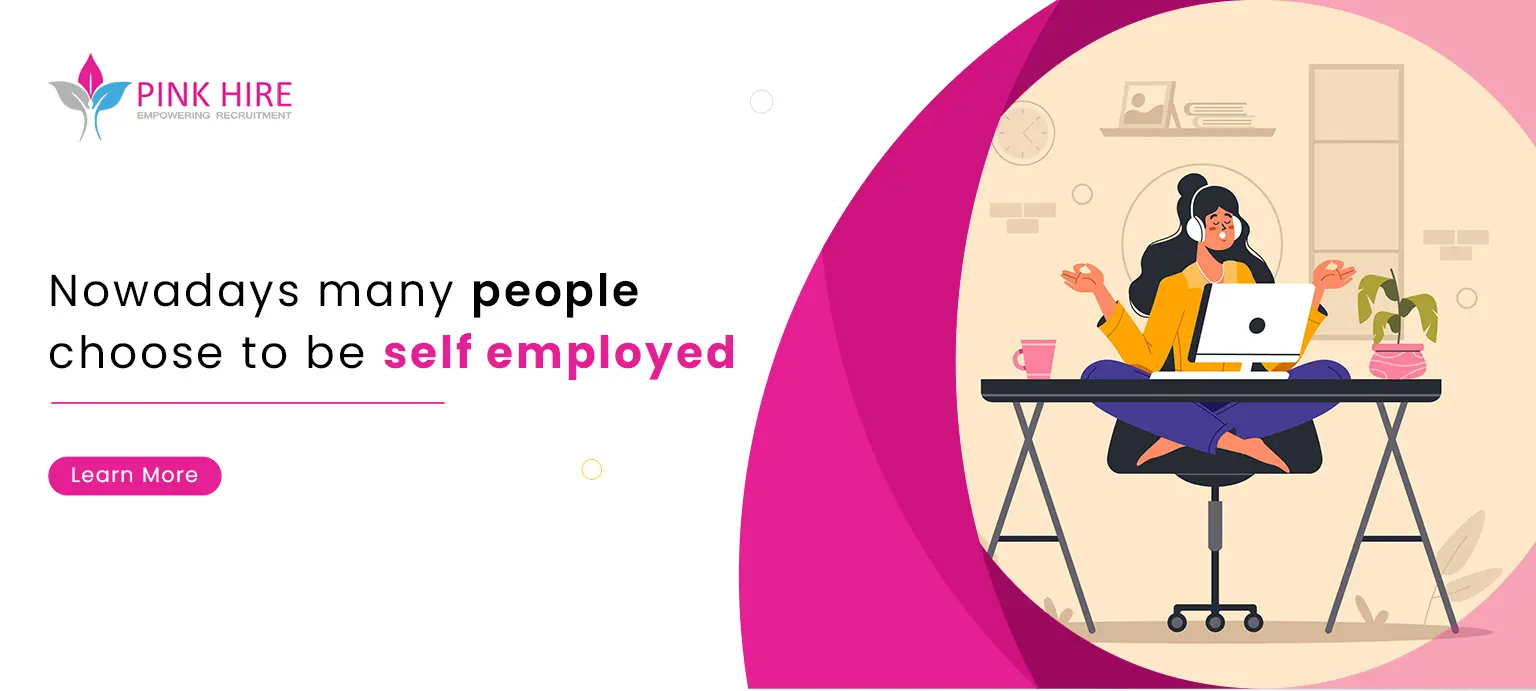Are you tired of the 9 to 5 grind? Do you dream of being your own boss and setting your own schedule? Nowadays many people choose to be self employed, and for good reason. Being self-employed offers a world of opportunities and freedom that traditional employment cannot provide. In this article, we will explore the reasons why so many individuals are opting for self-employment and the benefits it brings. So, if you’re considering taking the leap into self-employment, read on!
Table of ContentsWhat Does It Mean to Be Self-Employed?
Being self-employed means taking control of your professional destiny. It involves working for yourself and being responsible for the success of your own business or freelancing career. Unlike traditional employment, where you work for someone else, self-employment allows you to be the boss and make decisions that align with your goals and values.
The Freedom and Flexibility of Self-Employment
One of the primary reasons why many individuals choose to be self-employed is the freedom and flexibility it offers. When you’re self-employed, you have the power to set your own schedule and work on projects that interest you. You can say goodbye to the rigid 9-to-5 routine and create a work-life balance that suits your needs. Whether it’s working from home, traveling while you work, or taking time off when you need it, self-employment provides the freedom to design your own lifestyle.
Pursuing Your Passion and Finding Fulfillment
Do you have a passion that you’ve always wanted to turn into a career? Self-employment allows you to pursue your passion and turn it into a source of income. Whether you’re an artist, a writer, a consultant, or an entrepreneur, being self-employed enables you to do what you love and find fulfillment in your work. When you’re passionate about what you do, it doesn’t feel like work at all!
The Potential for Increased Earnings
While self-employment may come with its own set of challenges, one of the significant benefits is the potential for increased earnings. When you work for someone else, your income is often limited by a salary or hourly rate. However, as a self-employed individual, your earning potential is limitless. You have the opportunity to grow your business, attract more clients, and increase your rates as your skills and reputation improve. With dedication and hard work, you can significantly increase your earnings and have greater control over your financial future.
Taking Control of Your Career Path
Being self-employed means taking control of your career path. You no longer have to rely on others to determine your professional growth and development. Instead, you can set your own goals, make decisions based on your interests and expertise, and shape your career in a way that aligns with your aspirations. Whether you want to specialize in a particular niche, explore different industries, or diversify your skill set, self-employment provides the autonomy to steer your career in the direction you desire.
Overcoming the Challenges of Self-Employment
While self-employment offers numerous advantages, it’s important to acknowledge the challenges that come with it. As a self-employed individual, you are responsible for finding clients or customers, managing your finances, and handling all aspects of your business. This requires self-motivation, discipline, and resilience. It may take time to establish a stable income stream, and there will be inevitable ups and downs along the way. However, with perseverance and a growth mindset, you can overcome these challenges and build a successful self-employed career.
Building a Network and Expanding Your Opportunities
Networking is a crucial aspect of self-employment. By building a strong professional network, you open doors to new opportunities, collaborations, and partnerships. Networking allows you to connect with like-minded individuals, industry experts, and potential clients or customers. It helps you stay updated on industry trends, gain valuable insights, and expand your reach. By actively engaging in networking activities, both online and offline, you can build meaningful relationships that contribute to the growth and success of your self-employed venture.
The Importance of Self-Motivation and Discipline
When you’re self-employed, there’s no one to oversee your work or keep you accountable except yourself. Therefore, self-motivation and discipline are vital qualities to cultivate. You need to be able to set goals, prioritize tasks, and stay focused even when faced with distractions or challenges. Developing a routine, setting deadlines, and maintaining a strong work ethic are essential to ensure productivity and success in your self-employed endeavors.
Balancing Work and Personal Life as a Self-Employed Individual
Achieving a healthy work-life balance is crucial, especially when you’re self-employed. Without proper boundaries, it’s easy for work to seep into your personal life, leading to burnout and decreased overall satisfaction. As a self-employed individual, it’s important to establish clear boundaries between work and personal time. This may involve setting specific working hours, creating a designated workspace, and learning to prioritize self-care and leisure activities. Striking a balance between work and personal life allows you to maintain your well-being and enjoy the advantages of being your own boss.
Self-Employment as a Solution to Job Insecurity
Job insecurity is a concern for many individuals in the traditional employment sector. With rapid advancements in technology and the changing dynamics of industries, job stability is no longer guaranteed. Self-employment offers a viable solution to job insecurity. By creating your own business or freelancing career, you become immune to layoffs, downsizing, or industry shifts. You have control over your income and can adapt to market demands by diversifying your services or exploring new opportunities. Self-employment provides a sense of security and empowers you to navigate the ever-changing job landscape.
Embracing Creativity and Innovation
As a self-employed individual, you have the freedom to embrace creativity and innovation in your work. Unlike traditional employment, where conformity and adherence to established processes are often the norm, self-employment allows you to think outside the box and explore new ideas. You can experiment with innovative approaches, develop unique solutions for your clients or customers, and differentiate yourself in the market. Embracing creativity and innovation not only keeps your work exciting and fulfilling but also positions you as a forward-thinking professional in your industry.
The Tax Benefits of Being Self-Employed
Being self-employed comes with certain tax advantages. As a business owner or freelancer, you have the opportunity to deduct legitimate business expenses from your taxable income. This includes expenses such as office supplies, equipment, marketing costs, and even a portion of your home if you have a dedicated workspace. Additionally, you may be eligible for certain tax credits and deductions that are specific to self-employed individuals. It’s essential to consult with a tax professional or accountant to ensure you take full advantage of these benefits and comply with all tax regulations.
How to Get Started as a Self-Employed Professional
If you’re considering embarking on a self-employed journey, getting started may seem overwhelming. However, with careful planning and preparation, you can set yourself up for success. Here are some steps to guide you:
Identify your skills and passions:
Assess your strengths, interests, and expertise to determine the services or products you can offer as a self-employed professional.
Conduct market research:
Investigate the demand for your chosen niche and identify your target audience. Analyze competitors and find ways to differentiate yourself in the market.
Develop a business plan:
Create a comprehensive business plan that outlines your goals, target market, marketing strategies, financial projections, and operational details.
Establish a professional presence:
Build a professional website, create a strong online presence through social media platforms, and develop a cohesive brand identity.
Network and seek opportunities:
Attend industry events, join professional associations, and engage in online communities to connect with potential clients or customers and expand your network.
Set up your business infrastructure:
Register your business, obtain any necessary licenses or permits, and set up a system for managing finances, contracts, and administrative tasks.
Market your services:
Develop a marketing strategy to promote your services or products. Utilize various channels such as social media, content marketing, email marketing, and networking to reach your target audience.
Remember, building a successful self-employed career takes time and effort. Stay focused, continuously learn and adapt, and embrace the journey of entrepreneurship.
Common Mistakes to Avoid in Self-Employment
While self-employment offers numerous benefits, it’s essential to be aware of common mistakes that many individuals make. By avoiding these pitfalls, you can increase your chances of success. Here are some mistakes to steer clear of:
Lack of financial planning:
Failing to plan and manage your finances effectively can lead to financial instability and difficulties in sustaining your self-employed career. Ensure you have a budget, track your expenses, and set aside funds for taxes and emergencies.
Over committing or undercharging:
It’s crucial to strike a balance between taking on too many projects and undercharging for your services. Be selective in choosing clients and projects that align with your expertise and financial goals.
Neglecting self-care:
Self-employment can be demanding, and it’s easy to get caught up in work and neglect self-care. Prioritize your well-being by taking breaks, practicing self-care activities, and maintaining a healthy work-life balance.
Not investing in professional development:
Continuous learning and skill enhancement are key to staying competitive in the self-employed landscape. Invest in courses, workshops, or certifications that can enhance your skills and expand your knowledge.
Poor time management:
Effective time management is crucial when you’re self-employed. Avoid procrastination, set realistic deadlines, and prioritize tasks based on their importance and urgency.
By being mindful of these common mistakes, you can navigate your self-employed journey with confidence and increase your chances of long-term success.
ConclusionIn conclusion, the decision to become self-employed is a choice that offers a world of opportunities and benefits. From the freedom and flexibility to pursue your passions and find fulfillment to the potential for increased earnings and control over your career path, self-employment has become an attractive option for many individuals. While it comes with its own set of challenges, such as building a network, maintaining self-motivation, and balancing work and personal life, the rewards outweigh the drawbacks.
By embracing creativity and innovation, taking advantage of tax benefits, and investing in your professional development, you can thrive as a self-employed professional. Remember to avoid common mistakes, plan your finances effectively, and prioritize self-care to ensure long-term success.
Now, let’s move on to some frequently asked questions about self-employment:
FAQ
What are the advantages of being self-employed?
Being self-employed offers freedom and flexibility in setting your own schedule, pursuing your passions, and potentially increasing your earnings.
How do I overcome the challenges of self-employment?
Overcoming challenges in self-employment requires self-motivation, discipline, networking, and a growth mindset. It’s important to stay focused and persevere through the ups and downs.
Are there tax benefits to being self-employed?
Yes, self-employed individuals can take advantage of tax deductions for business expenses and may be eligible for specific tax credits and deductions. Consult with a tax professional for personalized advice.
How do I get started as a self-employed professional?
Start by identifying your skills and passions, conducting market research, developing a business plan, establishing a professional presence, networking, and marketing your services or products.
What mistakes should I avoid in self-employment?
Common mistakes to avoid include poor financial planning, over committing or undercharging, neglecting self-care, not investing in professional development, and poor time management.
By addressing these FAQs, we hope to provide valuable insights and guidance for individuals considering or already pursuing self-employment.
Remember, being self-employed is an exciting and rewarding journey that allows you to take control of your professional life. Embrace the opportunities, learn from the challenges, and enjoy the freedom and fulfillment that comes with being your own boss.
Nowadays, many people choose to be self-employed, and it’s no wonder why. The benefits of self-employment are vast, from the freedom and flexibility to pursue your passions to the potential for increased earnings and control over your career path. If you’re considering taking the leap into self-employment, seize the opportunity, plan your path, and embark on a fulfilling and successful journey.
If you are the office seeker or employer, you can contact with Pink Hire. Pink Hire is the best recruitment agency in Kolkata.




